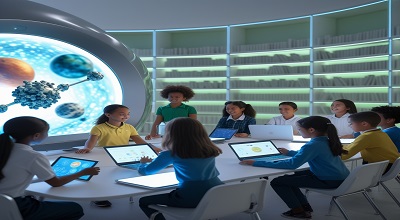AI Personalized Learning Tools
AI Personalized Learning Tools: Artificial Intelligence (AI) has become a transformative force in education, enabling personalized learning experiences that cater to the unique needs of each student. In 2025, AI-powered tools have evolved to offer adaptive learning paths, real-time feedback, and tailored content, enhancing student engagement and academic performance. This article explores the latest AI personalized learning tools, their applications, and examples of their implementation in educational settings.
Understanding Personalized Learning
Personalized learning refers to an educational approach that tailors instruction to individual students’ strengths, needs, and interests. AI facilitates this by analyzing student data to provide customized learning experiences, ensuring that each learner progresses at their own pace and receives the support they require.
Key Components of Personalized Learning
- Adaptive Learning Systems: These systems adjust the difficulty level of content based on a student’s performance, ensuring that learners are consistently challenged without feeling overwhelmed.
- Real-Time Feedback: AI tools provide instant feedback on assignments and assessments, allowing students to understand their mistakes and learn from them promptly.
- Data-Driven Insights: By analyzing student interactions and performance, AI tools offer insights into learning patterns, helping educators make informed decisions.
Top AI Personalized Learning Tools in 2025
1. GPTutor
GPTutor is an AI-powered platform that generates personalized learning content using large language models. It adapts educational materials to align with individual students’ interests and career goals, enhancing engagement and understanding of academic concepts. GPTutor utilizes a serverless architecture to deliver scalable learning experiences, providing tailored educational journeys for each student.
2. Iris
Iris is an AI-driven virtual tutor designed for computer science education. Integrated into the interactive learning platform Artemis, Iris offers personalized, context-aware assistance in large-scale educational settings. It guides students through programming exercises by providing subtle hints and fostering independent problem-solving skills. Iris’s calibrated assistance ensures that students receive relevant support without revealing complete solutions.
3. QANDA
QANDA is an AI-based learning platform that utilizes optical character recognition technology to scan problems and provide step-by-step solutions. It offers personalized learning assistance through features like one-on-one tutoring and study timers. QANDA’s MathGPT, a math-specific large language model, has set new benchmarks in mathematical performance, providing accurate and efficient solutions to complex problems.
4. CodeTailor
CodeTailor leverages large language models to provide personalized Parsons puzzles, a type of coding exercise where students arrange mixed-up code blocks in the correct order. This approach encourages cognitive engagement and active learning, helping students understand programming concepts more effectively. CodeTailor’s personalized support fosters reflection and boosts confidence in novice programmers.
5. Brainly AI Learning Companion
Brainly’s AI Learning Companion offers personalized tutoring experiences by providing human-like assistance in various subjects. It tailors content to individual learning styles and needs, enhancing student comprehension and retention. Brainly’s approach combines AI technology with community and expert verification, ensuring the accuracy and reliability of educational content.
Benefits of AI Personalized Learning Tools
- Enhanced Engagement: Tailored content and adaptive learning paths keep students motivated and interested in their studies.
- Improved Academic Performance: Personalized support helps students grasp concepts more effectively, leading to better grades and understanding.
- Efficient Use of Educational Resources: AI tools automate administrative tasks, allowing educators to focus more on teaching and less on paperwork.
- Accessibility: AI-powered tools can be customized to support students with diverse learning needs, including those with disabilities.
Challenges and Considerations
While AI personalized learning tools offer numerous benefits, their implementation comes with challenges:
- Data Privacy: Collecting and analyzing student data raises concerns about privacy and security.
- Bias in AI Models: AI systems may inadvertently perpetuate biases present in training data, affecting the fairness of learning experiences.
- Dependency on Technology: Over-reliance on AI tools may hinder the development of critical thinking and problem-solving skills.
- Equity of Access: Not all students have equal access to technology, potentially widening the digital divide.
Future Trends in AI Personalized Learning
The future of AI in personalized learning looks promising, with several emerging trends:
- Integration of Emotional Intelligence: AI tools are being developed to recognize and respond to students’ emotional states, providing support that caters to their emotional needs.
- Multimodal Learning: Incorporating various forms of media, such as videos and interactive simulations, to enhance learning experiences.
- Collaborative Learning Environments: AI-powered platforms that facilitate peer-to-peer learning and collaboration among students.
- Lifelong Learning: AI tools supporting continuous learning beyond traditional educational settings, catering to adult learners and professionals.
Conclusion
AI personalized learning tools are transforming education by providing tailored learning experiences that cater to individual student needs. As these technologies continue to evolve, they hold the potential to make education more engaging, effective, and accessible for all learners.
Frequently Asked Questions (FAQs)
1. What is personalized learning?
Personalized learning is an educational approach that tailors instruction to individual students’ strengths, needs, and interests, ensuring that each learner progresses at their own pace.
2. How do AI tools personalize learning?
AI tools analyze student data to provide customized learning experiences, adjusting content difficulty, offering real-time feedback, and delivering tailored resources based on individual performance.
3. Are AI personalized learning tools suitable for all age groups?
Yes, AI personalized learning tools can be adapted for various age groups, from K-12 students to adult learners, providing appropriate content and support for each stage of learning.
4. Do AI personalized learning tools replace teachers?
No, AI tools complement educators by automating administrative tasks and providing personalized support, allowing teachers to focus more on instruction and student engagement.
5. How can I implement AI personalized learning tools in my educational setting?
To implement AI personalized learning tools, assess your institution’s needs, select appropriate tools that align with your curriculum, and provide training for educators to effectively integrate these technologies into their teaching practices.
Free Download: The Amazing Spider-Man 2 APK
